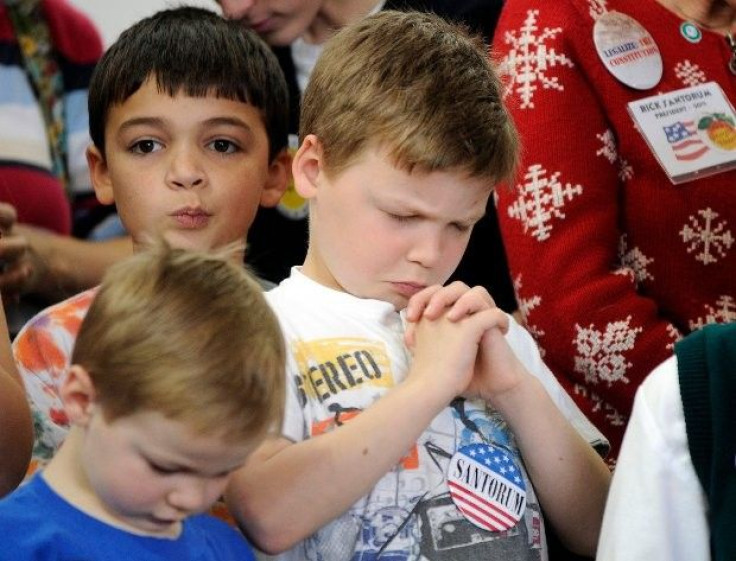Missourians Pass 'Right to Pray' Amendment, Reiterating Religious Protections For All -- Except Prison Inmates

In Missouri, reinforcing citizens' right to pray in public is apparently far more of a concern than ensuring the state's poorest citizens can earn a living wage. At least, that's what one can infer from Tuesday night's primary.
Voters overwhelmingly approved what has become known as the "right to pray" amendment, with 82 percent in favor of the statewide ballot initiative that supporters say protects the religious liberty of residents and students by allowing them to publicly practice their religion. According to the text of the measure, the amendment - in addition to reiterating the right of people to pray in public as long as it does not disturb the peace - also says students can express their beliefs in school and cannot be compelled to participate in school assignments or educational presentations that allegedly violate their religious beliefs.
Missouri public schools will also be required to post the text of the Bill of Rights, presumably because of its reference to religious liberty.
State lawmakers say the amendment is far from dramatic, and is intended to remind the general public that religious values are important and should not be pushed aside in a secular society.
"We're not changing anything except the way people are thinking and getting that message out to the schools, school administrators and the teachers and letting people know, 'You want to pray? Go ahead, it's OK,' " Republican state Rep. Mike McGhee, who sponsored the measure, told The Associated Press on Tuesday.
The Missouri Constitution already states that "All men have a natural and indefensible right to worship Almighty God according to the dictates of their own consciences; that no human authority can control or interfere with the rights of conscience."
But paradoxically, the American Civil Liberties Union (ACLU) of Eastern Missouri claims the amendment could actually strip religious protections for at least one sector of society -- prison inmates.
The text of the amendment contains a provision stating it should "not be construed to expand the rights of prisoners in state or local custody beyond those afforded by the laws of the United States," something the ACLU believes could be interpreted to strip prisoners of their right to practice their faith while incarcerated.
"The people of Missouri have a right to know exactly what they're voting for," said Anthony Rothert, legal director of the ACLU of Eastern Missouri, said in a statement announcing a lawsuit the organization had filed challenging the description of the amendment on the 2012 ballot. "The disingenuous way this amendment is described on the ballot is clearly meant to persuade the voters to approve it without knowing what it really says."
The ACLU's legal challenge was rejected earlier this year.
The amendment, as it appeared on Tuesday's ballot, did not include the prisoner provision. Instead, the official language stated:
A "yes" vote will amend the Missouri Constitution to provide that neither the state nor political subdivisions shall establish any official religion. The amendment further provides that a citizen's right to express their religious beliefs regardless of their religion shall not be infringed and that the right to worship includes prayer in private or public settings, on government premises, on public property, and in all public schools. The amendment also requires public schools to display the Bill of Rights of the United States Constitution.
Moreover, the ACLU claims the amendment may actually compromise the education of public school students since it allows them to opt out of assignments that supposedly clash with their faith, something the civil liberties organization says could deprive those students of the opportunity to learn about cultures and concepts that are a part of a comprehensive and quality education.
Opponents say the battle is far from over. Both Rothert and Karen Aroesty, the regional director for the Anti-Defamation League, told the AP the measure's ambiguous language opens the door to "a lot of litigation," particularly because it may force schools to evaluate what constitutes a legitimate complaint regarding assignments that violate religious beliefs.
But while Missourians have reinforced their right to pray, they will did not support two proposals that may have overwhelming helped low-income residents. Voters rejected two proposed ballot initiatives for the Nov. 6 election - one which would have raised the state minimum wage to $8.50 an hour, and another that would have put new restrictions on payday and other small loans.
© Copyright IBTimes 2024. All rights reserved.











